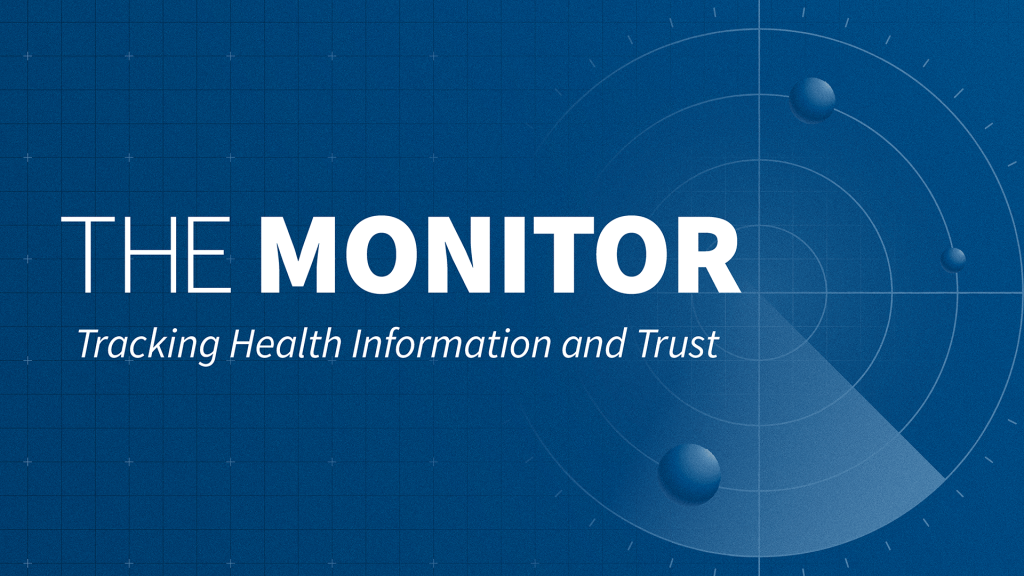VOLUME 30
Changing COVID-19 Booster Policies and Florida’s Decision to End Vaccine Mandates Create Confusion
Summary
This volume explores confusion around COVID-19 booster eligibility as federal recommendations shift and conflicting guidance from physician organizations creates uncertainty for patients. It also looks at Florida’s decision to end school vaccine mandates, with some social media users confusing it with a statewide vaccine ban. Lastly, it highlights research demonstrating that artificial intelligence chatbots can provide generally sound advice for cardiovascular health, but struggle to make specific and personalized recommendations.
Recent Developments
Online Discussion Reflects Confusion About COVID-19 Booster Eligibility
Conversation about COVID-19 vaccines and boosters on social media in late August and early September reflected confusion about eligibility following an FDA decision to only approve updated booster shots for people age 65 and older, or with underlying health conditions. The limited approval represents a shift from previous recommendations that included healthy children and young adults. The change follows a May announcement by the Centers for Disease Control and Prevention (CDC) that COVID-19 vaccines would no longer be recommended for healthy pregnant people and only after a shared clinical decision-making process for healthy children. Online reaction to the FDA decision combined praise for Secretary of Health and Human Services (HHS) Robert F. Kennedy Jr. with the spread of false vaccine safety claims. Kennedy’s post about the announcement on X received 77,000 likes and 15,000 reposts, including endorsements from influential accounts with follower counts ranging from over 100,000 to more than a million. Some reposts praised the decision and repeated claims that COVID-19 vaccines are unsafe for human use, while others shared anecdotal stories of health decline following mRNA vaccination. Others, though, expressed concern about their ability to receive the updated vaccines, which specifically target the currently circulating variants of the virus.
In contrast with official guidance from government agencies, leading physician organizations, including the American Academy of Pediatrics (AAP) and American College of Obstetricians and Gynecologists (ACOG), have issued broader guidelines for COVID-19 boosters, consistent with their past recommendations. These guidelines cite evidence that vaccines prevent severe illness and death in healthy children and pregnant people. Historically, these organizations’ guidelines have generally aligned with federal agencies, but recent conflicting vaccine recommendations may contribute to confusion and varying levels of trust. KFF’s July Tracking Poll on Health Information and Trust found that personal doctors or health care providers remain the most trusted source for information about vaccines, with 83% of adults saying they trust their doctor “a great deal” or “a fair amount” to provide reliable vaccine information. Only 57% say they have the same level of trust in the CDC.
The conflicting guidance and confusion about eligibility comes after the KFF poll found that most adults do not plan to receive the updated COVID-19 vaccine this fall. Most of the public (59%) said they would “probably not” or “definitely not” get the booster, while one-third (33%) of adults said they were concerned that the vaccine would not be available to them. Black and Hispanic adults, who have been disproportionately affected by COVID-19, were among the most concerned about access to this fall’s vaccine. HHS Secretary Kennedy indicated in a post on X that the boosters would remain available for all patients who wish to receive them after consulting with a doctor. Kennedy later reiterated that claim in testimony before a Senate panel, referring to the practice of off-label prescribing, which occurs when a doctor prescribes a drug for a use not approved by the FDA. Prescriptions have not been required for previous formulations of the booster vaccines, and some doctors and pharmacists have expressed hesitancy to prescribe the updated boosters for off-label use. Insurance coverage may also be affected; insurers are generally required to cover vaccines recommended by the ACIP and adopted by the CDC. The advisory committee is expected to issue its updated vaccination guidelines this month.
Some Social Media Users Conflate Florida’s Move to End School Vaccine Mandates with a Vaccine Ban
Confusion about vaccine eligibility also appeared in online reaction to a Florida proposal to end school mandates for routine childhood vaccination, with some posts misrepresenting the policy shift as a statewide ban on vaccines. Florida’s Surgeon General announced in early September that the state planned to end all vaccine mandates, including those required for school entry. KFF’s monitoring of social media indicated that there were more posts on X about vaccines on the day of the announcement than at any other point this year thus far. Some posts observed in KFF’s monitoring of social media mistook the Florida policy for a “ban” of vaccines, but government officials framed the decision as removing requirements while keeping vaccines available to families who choose them. Prior to this decision, all 50 states had required children starting school to be vaccinated against transmissible diseases, including measles, mumps, and rubella (MMR).
The proposed policy change comes as childhood vaccination rates are declining and falling below levels that epidemiologists say are needed to prevent disease outbreaks. An August KFF issue brief detailed that nationwide, the MMR vaccination rate has fallen below the federal target of 95% in every year since 2020. Some states, including Florida, had lower rates of coverage, with just 89% of kindergarteners in Florida vaccinated against MMR in the 2024-2025 school year. Despite the move to eliminate mandates, findings from a KFF-Washington Post survey show that most Florida parents support public school vaccine mandates. 82% of Florida parents, and 81% of parents nationwide, said they believed public schools should require vaccines for measles and polio, with some religious or medical exemptions.
The Florida announcement comes as officials in some other states have indicated plans to make their own vaccine recommendations, expressing concerns about federal vaccine policy decisions by the Trump administration. Some vaccinologists have warned that diverging state and federal guidance could broadly undermine trust in vaccines and public health institutions and leave parents unsure about which guidance to follow.
AI & Emerging Technology
Chatbots Perform Well for Heart Health Advice, But Struggle with Details
A recent study published in Cureus evaluated how well four leading artificial intelligence (AI) chatbots perform in providing advice for cardiovascular health, finding that most AI models can generally offer sound guidance but fall short in delivering specific, actionable recommendations. Researchers tested ChatGPT, Claude AI, DeepSeek AI, and Google Gemini using 15 standardized questions drawn from diet and exercise guidelines published by organizations like the American Heart Association (AHA) and European Society of Cardiology (ESC). Medical professionals then rated the appropriateness of the chatbots’ responses, finding that all responses to questions about physical activity met established standards. Of the questions about diet, 90% of responses from ChatGPT, Claude, and DeepSeek met established standards, while Gemini performed slightly worse at 80%.
The study revealed limitations despite the generally positive results. While the chatbots’ recommendations were not dangerous, they sometimes went beyond official guidelines in ways that could be helpful for healthcare providers to understand. For example, the models sometimes suggested activities like yoga, tai chi, and water aerobics that were not included in cardiovascular disease association guidelines but may appeal to patients seeking more holistic or natural approaches to heart health. In response to questions about diet, the models struggled with dietary specifics, failing to provide precise quantitative guidelines on carbohydrate and added sugar intake. Gemini, for example, recommended consuming less added sugar, but did not include the specific recommendation from both the AHA and ESC that added sugars should account for less than 10% of total caloric intake.
The research suggests that as patients increasingly turn to AI for health information, healthcare providers may benefit from being aware of the types of advice patients are receiving from these sources. Increased awareness could help clinicians provide more comprehensive medical guidance that acknowledges patients’ interest in alternative approaches while ensuring they receive evidence-based care. While these AI tools can effectively supplement guidance from medical professionals, they can not replace personalized, quantitative recommendations that may be offered by physicians or other licensed providers like nutritionists or dieticians. Users should verify AI-generated health advice with their healthcare providers before making significant lifestyle changes.
Support for the Health Information and Trust initiative is provided by the Robert Wood Johnson Foundation (RWJF). The views expressed do not necessarily reflect the views of RWJF and KFF maintains full editorial control over all of its policy analysis, polling, and journalism activities. The data shared in the Monitor is sourced through media monitoring research conducted by KFF.





